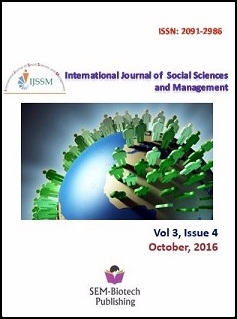Employees’ Perception Regarding the Role of Specific HRM Practices in Knowledge Intensive Firms
DOI:
https://doi.org/10.3126/ijssm.v3i4.15888Keywords:
Recruitment and selection, Reward systems, Employees’ knowledge Sharing, Individual capability, organisational capabilityAbstract
The purpose of this paper is to investigate the employees’ perceptions about association between specific HRM practices and employees’ knowledge sharing. Based on previous literature, a model is proposed for the study and hypotheses are formulated. The cross-sectional dataset comes from a sample of 390 employees of 19 Pakistani KIFs. Confirmatory factor analyses were employed to evaluate the reliability and validity of the measurement model and the research model was tested using structural equation modeling. The results suggest that specific HRM practices, for instance, recruitment and selection and reward systems show a positive relationship with knowledge sharing, as perceived by the employees of these organisations. We also found a positive relationship among individual and organisational capability in workplaces. A key finding of this study is that recruitment and selection have a much greater impact on knowledge sharing than reward systems. In this study, knowledge-sharing behaviour is examined using specific HRM practices. Findings should be confirmed using a larger sample, as well as through longitudinal study. This study will be beneficial for researchers, practitioners, scholars, organisational leaders and employees. It will also be helpful for those interested in organisational structure and relationships across organisations in knowledge context. This study makes a valuable contribution, given that there is a lack of empirical studies of this nature focusing on the South East Asian region. Our findings are more interesting given that the current study is based on employees’ perception and employees’ views are similar to than that of management’s views in KIFs.
Int. J. Soc. Sc. Manage. Vol. 3, Issue-4: 246-255
Downloads
Downloads
Published
How to Cite
Issue
Section
License
This license enables reusers to distribute, remix, adapt, and build upon the material in any medium or format for noncommercial purposes only, and only so long as attribution is given to the creator.




